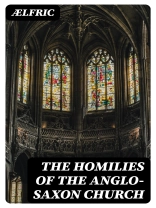The Homilies of the Anglo-Saxon Church, crafted by the renowned Ælfric in the late 10th century, presents a compelling collection of sermons that reflect the ecclesiastical and social mores of early medieval England. Demonstrating a distinct blend of biblical exegesis and vernacular prose, Ælfric’s work serves as both a theological treatise and a didactic tool, aimed at enriching the faith of lay audiences. Influenced by the pedagogical style of early Church Fathers, Ælfric employs a narrative form supplemented by eloquent parables, offering insights into Christian doctrine and moral teachings relevant to his contemporaries amidst an evolving cultural landscape. Ælfric, a Benedictine monk and key figure in Anglo-Saxon literature, was profoundly shaped by his experiences in monasteries, infusing his writings with a sense of pastoral care and community engagement. Educated in Latin and well-versed in ecclesiastical traditions, he sought to bridge the gap between sophisticated theological concepts and the common populace’s understanding. His commitment to the vernacular exemplified a pivotal movement towards democratizing access to sacred texts in an age where Latin predominated. This remarkable anthology is essential reading for historians, theologians, and literary enthusiasts alike, as it not only provides profound insights into the spiritual life of the Anglo-Saxon era but also showcases Ælfric’s masterful command of language and intention to illuminate foundational Christian values. Engaging with The Homilies enriches one’s understanding of the period’s cultural heritage while offering timeless moral reflections.
Über den Autor
Ælfric of Eynsham, often known simply as Ælfric, was a pivotal figure in the development of English literature and religious thought during the late 10th and early 11th centuries. Renowned as a scholar, educator, and abbot, Ælfric is perhaps best known for his collection ‚The Homilies of the Anglo-Saxon Church‘, which is a series of sermons intended to assist with the preaching of the word of God, in alignment with the liturgical calendar. These homilies are significant works that reflect Ælfric’s commitment to the pastoral care of the English-speaking populace and his desire to make religious teachings accessible. Ælfric’s style is characterized by its clarity, organization, and the use of Old English vernacular, which set a precedent for future English prose. His excellent command of language allowed him to translate many Latin texts, thereby playing a crucial role in the transmission of Christian doctrine and classical learning. Besides his homilies, Ælfric also authored a number of other pedagogic and theological works, such as ‚A Colloquy‘, which serves as a unique insight into the daily life and language of the period. His contributions to Old English writing and the Church’s education were fundamental, making Ælfric an essential figure in the canon of medieval English authors. His work not only provided moral guidance but also served as a foundation for the English language’s literary tradition.












